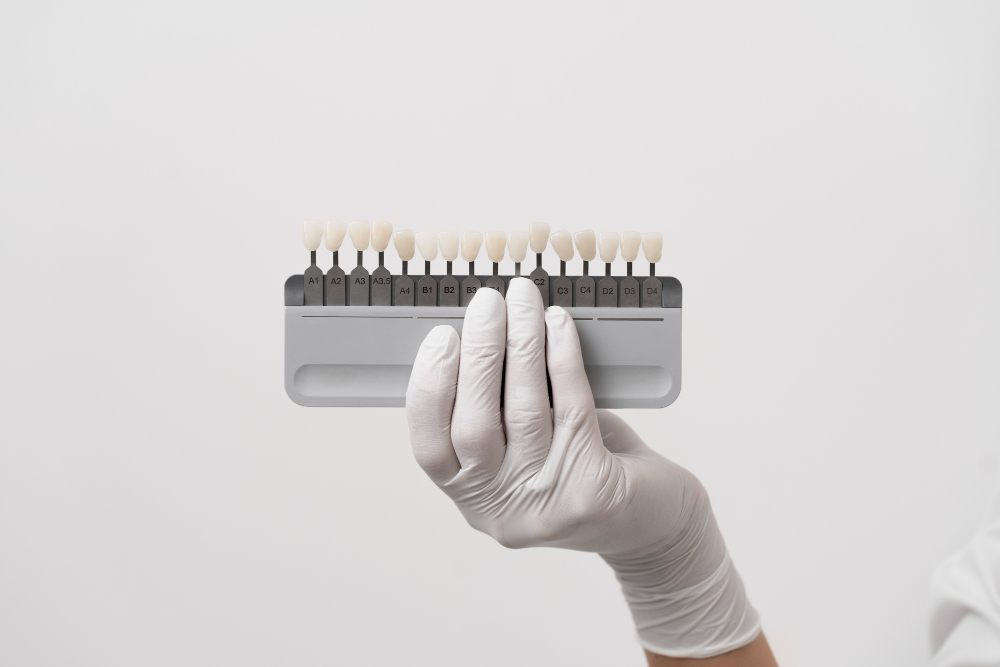Veneers vs lumineers both transform smiles. They conceal tooth flaws, brighten grins, and alter appearances. Each offers unique benefits and drawbacks. Knowing them helps you choose wisely. Read on to understand the considerations for veneer teeth vs lumineers.
What are Veneers?
Veneers are thin, tailor-made shells that mask the front teeth and elevate their appearance. Dentists craft them from porcelain or resin. With careful maintenance, they can endure for years.
How are Veneers Made?
Dentists capture an impression of your teeth. This molds a precise fit. They shave a thin layer of enamel from each tooth. This allows space for the veneer. Then they bond the veneer to the tooth. It integrates as part of your smile.
Pros of Veneers
The following are some advantages of veneers:
- Durable: Veneers can endure over a decade.
- Stain Resistant: Porcelain veneers repel stains well.
- Customizable: Dentists match shape and color.
- Improves Appearance: Veneers repair chips, gaps, and cracks.
Cons of Veneers
The following are some disadvantages of veneers:
- Irreversible: Tooth shaving is permanent.
- Expensive: Veneers demand a substantial investment.
- Sensitivity: Teeth might twinge after the procedure.
- Risk of Damage: Hard foods can fracture veneers.

What are Lumineers?
Lumineers are a specialized kind of veneer. They are ultrathin and minimally invasive. Dentists often select them as a gentle alternative to veneers. They upgrade smiles without significantly altering teeth.
How are Lumineers Made?
Dentists obtain an impression of your teeth. They create custom lumineers in a lab. Unlike veneers, lumineers need no enamel trimming. Dentists affix them directly to the teeth. The process is swift and simple.
Pros of Lumineers
The following are the advantages of lumineers:
- Less Invasive: No tooth shaping is required.
- Reversible: Removal is possible without harm.
- Natural Look: They blend seamlessly with real teeth.
- Lower Sensitivity Risk: Minimal impact on tooth structure.
Cons of Lumineers
The following are the disadvantages of lumineers:
- Not for Severe Cases: They suit only slight corrections.
- Less Durable: Lumineers might not withstand as long.
- Prone to Damage: Thinner material can fracture easily.
- Higher Cost: They are costly, often matching veneer prices.
Veneers vs Lumineers
When it comes to veneers vs lumineers, each has its appeal and challenges. Veneers suit those desiring endurance and extensive correction. Lumineers work best for minor changes with less impact on teeth.
Thickness and Fit
- Veneers are thicker, concealing more flaws.
- Lumineers are thin and blend into natural teeth.
Tooth Preparation
- Veneers need tooth shaping.
- Lumineers need minimal or no prep.
Durability
- Veneers are strong and built to last.
- Lumineers are thinner and may wear down sooner.
Appearance
- Both look natural and vibrant.
- Veneers cover more imperfections but stand out slightly.
Procedure Time
- Veneers often require multiple visits.
- Lumineers typically need fewer appointments.

Costs of Veneers vs. Lumineers
Both come at a high price. Veneers can cost between $800 and $2,500 per tooth. Lumineers may range from $800 to $2,000 per tooth. Insurance rarely foots the bill for cosmetic veneers or lumineers.
Pain and Sensitivity
Veneers involve enamel trimming. This can cause postprocedure twinges. Lumineers don’t need much shaping. They lower the risk of sensitivity.
Longevity
Veneers can endure 1015 years with proper care. Lumineers may last around 10 years. Avoid hard items with either.
Maintenance
Both demand regular brushing and flossing. Avoid biting hard, sticky foods. A night guard can shield them from grinding damage.
Who Should Choose Veneers?
Veneers are ideal for:
- Those seeking strong, lasting solutions.
- People with deep stains or visible damage.
- Those ready for a more invasive procedure.
Who Should Choose Lumineers?
Lumineers are perfect for:
- People need slight cosmetic adjustments.
- Those who want a reversible option.
- Patients seeking a gentle, painless process.
Conclusion
Both veneers and lumineers have their perks and pitfalls. Dental veneers provide durability but require enamel shaping. Lumineers are less invasive but may wear out faster. The ideal choice depends on your dental needs and budget. Consulting a dentist can help you make the right choice in lumineers vs veneers.
Our experts at Le Sueur Family Dental can help you make the best choice for your unique smile transformation needs. If you’re confused between veneers vs lumineers, we can help you decide! Unlock a future with enhanced dental aesthetics and health at Le Sueur Family Dental. Contact us today or schedule an appointment to learn more.

